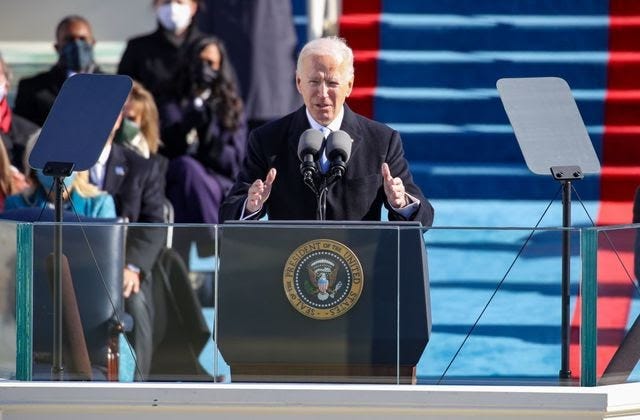Biden’s ‘unity’ is unlikely, but possible
It will take a vaccine win and big blows to lenders and landlords
Thanks for reading another round of Contention! This one will take just about six minutes to read. Know somebody who might like it? Share with them here:
U.S. President Joseph Biden took power yesterday with promises to restore political unity to the deteriorating superpower’s society. Contention has recently explored the overarching reasons for U.S. decline, but it is important to recognize that these phenomena are not linear. Temporary reversals -- periods of relative economic health -- are likely, and a significant economic rebound could help ease political tensions in the United States.
Accomplishing this task will mean navigating at least three economic minefields in 2021:
the COVID vaccine rollout
consumer debt and forbearance normalization
commercial real estate write offs
This will be extremely challenging for the Biden administration, but if they are willing to upset big business, they may get the unity they promised -- for a while.
We covered some of the main obstacles to the vaccine rollout in our newsletter Monday. Economists across the board acknowledge that overcoming these challenges will mean major gains for the U.S. economy this year. The Wall Street Journal poll of economists raised their 2021 GDP growth forecasts from 3.7% to 4.3% in a single month -- all pinned on Biden executing the rollout better than former president Donald Trump.
The problem, of course, is actually delivering the vaccine in time. New, more infectious strains of the disease will raise the population vaccination threshold necessary for herd immunity. But fully 32% of nursing home workers in New York State have refused the vaccine, and earlier this month France had delivered only 515 vaccines in the entire country -- compared to 944,000 in the U.K. -- due to widespread hesitancy to accept the jab.
Whether Biden overcomes this resistance with a big new round of spending for carrots or with the stick of mandatory dosing, the situation does not bode well for the “unity” he promised this week.
The vaccine, however, may be less thorny than the situation he faces in terms of consumer debt.
Biden today extended the student loan payment freeze for 41 million people until October.
Between five and six percent of all mortgages are in forbearance -- at least 2.7 million loans.
19 million people in 8.1 million rental units are behind on their rent, owing an estimated $70 billion by the end of this month. That amounts to $6,000 per renter, and Biden extended the federal eviction moratorium by two months.
There are only two basic ways to resolve these debts: either the creditors write them off, taking a blow to their balance sheets; or they start collecting the arrears sometime this year, draining away much of any coming recovery. This too is a bad recipe for “unity.”
Finally, the radical dislocation in workstyles and commerce brought on by the pandemic mean a major revaluation of commercial real estate. At least 60% of employers say they will allow some ongoing level of work from home, which means a double digit level of reduced demand for office space. Hard-hit San Francisco -- for example -- lost 85% of its office space leasing activity in 2020.
This same phenomenon allows workers in the most expensive real estate markets to move from their costly multi-family housing to suburban homes or other, cheaper cities. Fourteen of the 17 priciest rental markets saw average rents decline by double digits last year, with New York and San Francisco leading the way with 29% drops each.
This is a huge problem for landlords, as commercial property values are determined by “direct capitalization.” Investors take the net operating income of a property -- the amount of rent money left over after paying all expenses -- and divide it by a “capitalization rate” closely tied to interest rates. Low interest rates mean that every dollar of lost rent translates into huge reductions in property valuations.
The United States has $3.66 trillion in outstanding commercial real estate debt -- on offices, retail, multifamily housing -- and every downtick in demand means more properties go underwater. $430 billion of this debt matures in 2021: some owners will have to sell at distressed prices, others will surrender their collateral to their lenders, others will renegotiate terms -- in all cases, asset value disappears.
Unity is a function of shared interests -- when people are fighting over a shrinking set of resources they become desperate and bitter. At best, Biden has a plan for the vaccine rollout and a punt strategy for consumer debts. To date he has said nothing about the growing commercial real estate crisis. His only hope: pull off the vaccine rollout and then make lenders and landlords take a bath.
If President Biden can pull that off, there’s a chance he’ll get a couple of years of approval and calm. If he listens to those with the most power and money, however, his inauguration speech will be just the latest of a long line of presidential lies.
Disclaimer
Our only investment advice: Let it breathe.
Contact us with questions, feedback, or stories we might have missed.




